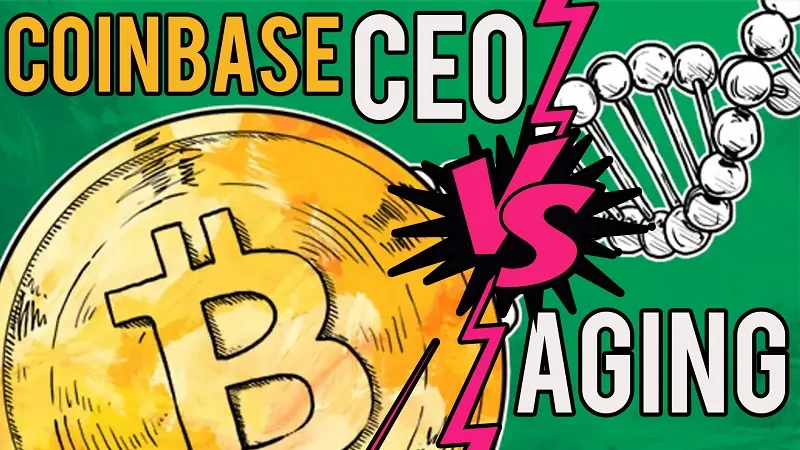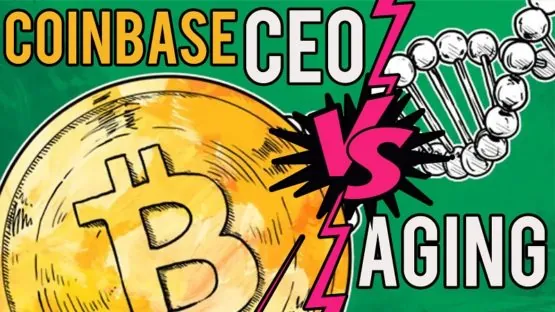On this episode of Lifespan News, Ryan O’Shea talks about how the CEO of Coinbase is contributing to the fight against aging.
Script
Another crypto billionaire is entering the fight against aging. The worlds of blockchain and venture capital are combining with the launch of NewLimit, an ambitious new company focused on radically extending human healthspan. We’ll tell you who is involved and what they are doing in this episode of Lifespan News!
NewLimit is being co-founded by Brian Armstrong, who is also the co-founder and CEO of Coinbase, the largest cryptocurrency exchange in the United States. Forbes puts his net worth at over $10 billion dollars, and he was the first cryptocurrency executive to sign the Giving Pledge, in which he promised to give away the bulk of his wealth to philanthropic causes.
This continues a recent string of blockchain pioneers getting involved in the longevity industry. Ethereum co-founder Vitalik Buterin has donated millions to various projects including the Methuselah Foundation, Richard Heart’s PulseChain sacrifice phase raised millions more for the SENS Research Foundation, Jed McCaleb of the Stellar Development Foundation (and formerly of Mt.Gox) has founded the Astera Institute, Juan Benet of Filecoin was a founding donor of the Impetus Grants, and groups such as VitaDAO and Gitcoin are working to fund and support longevity initiatives.
Armstrong will be joined at NewLimit by fellow co-founder Blake Byers, who most recently was a General Partner at Google Ventures. There he led investments in tech and biotech companies, and he holds a PhD in bioengineering from Stanford.
NewLimit has $105 million in committed funding from the founders for the first few years of operations. They plan to self-fund multiple rounds prior to seeking outside capital.
The founders announced the creation of NewLimit in a blog post, in which they said the following:
Aging is something that affects all of us, yet there are only a couple organizations in the world that are applying industrial scale to investigating the aging process. New Limit will start by deeply interrogating epigenetic drivers of aging and developing products that can regenerate tissues to treat specific patient populations. We will start by using primary human cells and reference species to develop machine learning models on what chromatin features change with age, which of these changes may be causal to the aging process, and finally develop therapies that could slow, halt, or reverse this process.
It is incredibly ambitious to try and cure aging and we believe this mission could take decades to achieve, if it is achievable at all, but that is precisely the reason we feel the urgency to get started today. The last decade has seen a cambrian explosion in the tools we have to probe and better understand biology. Forget just sequencing DNA. We can now sequence the DNA, RNA, and epigenetics of single cells, in an entire tissue, and retain the spatial representation of where the cells were. We can now track single proteins in real time as they shuttle around a cell and perform their tasks. These toolkits enable a four magnitude increase in feature space that we can leverage to better understand biological systems.
They went on to explain why they are focusing on epigenetics:
Fifteen years ago, a retrospectively obvious phenomenon was discovered: your cells are far more plastic than we had assumed. You can scrape a skin cell off your arm and reprogram it into a brain cell. In fact, you can take a skin cell from an old mouse and clonally turn it into a newborn mouse with an entire life ahead of it. Remarkably, to accomplish this magic, you only treat the cells with four types of proteins. In a system as complex as mammalian biology, with billions of DNA base pairs and tens of thousands of proteins, all it takes is dosing four proteins for a couple weeks to completely change what the cell “is”. New Limit plans to initially focus on this mechanism: epigenetic reprogramming. Put simply, we want to figure out a way to restore the regenerative potential we all had when we were younger, but somehow lost. The last year has emphasized this point on a global scale. We still do not know why the elderly have a weaker immune system and are more susceptible to infection and receive less protection from vaccines. You can go read all the textbooks and you won’t find any satisfying answers.
What will differentiate New Limit? We believe everyone benefits from more companies, research labs, and funding flowing into aging research. We are excited to see more companies being formed in this space, to build a larger ecosystem.
The most unique thing about New Limit will not be the idea or the capital we have access to. Instead it will be the people we hire and the culture we create. What differentiates SpaceX from NASA, or SpaceX from Blue Origin, is people and culture. We are not trying to build an institute or academic minded organization where papers are more important than products. Our goal is to build an ambitious, well run, for-profit company that will deliver revenue generating products on the way toward accomplishing its much bigger objective.
They then used the blog post to proactively address two criticisms they likely expect to hear – first, not many people would want to extend the years in which they are elderly and feeble, and two, that this technology will be only for the rich.
Some people have an aversion to the idea of living longer when they first hear about it. They are often imagining being frail in old age, and extending this unpleasant experience. The goal here is something quite different: extending human healthspan. Imagine if you could live the same number of years, but be free from pain, and have the same mobility and cognition as someone in their thirties. If we could maintain this state, how many of us would still want to have our lifespan end at the “normal” time? Aging is one of the largest sources of pain and suffering hiding in plain sight all around us, and we believe there is a moral imperative to try and end this suffering that affects every one of us.
Every breakthrough product, from cell phones to electric cars, started out with breakthroughs in basic science, which led to expensive early prototypes. But the cost of these products were driven down over time, to the point where they are becoming accessible to everyone. Some of these products take decades to get to lower costs, but we hope to move much faster than that. An example of potential with the right scale: Two years ago, mRNA therapeutics package in liquid nano particles were a product only reserved for expensive gene therapies, but in 2021 over a billion people received an mRNA LNP to immunize them against COVID for less than $20 a dose.
They currently have a placeholder website, newlimit.com where you can learn a bit more about the company and their hiring needs.
It seems that almost every week there is more news of additional people, particularly wealthy people, getting involved in the fight against aging, and I’m very eager to see what’s to come of this. However, I am a bit worried. I hope that we are not nearing the peak of a hype cycle, only to have these exciting updates result in a winter of disillusionment.
I’m encouraged to see that the founders of NewLimit, and other new initiatives, understand that they are getting involved in a difficult and expensive challenge that will require long-term commitment. These initiatives are going to need our support if they are to have any chance at success.
When there’s more to share we’ll bring it to you here, so please subscribe so you don’t miss out! I’m Ryan O’Shea and we’ll see you next time on Lifespan News!




